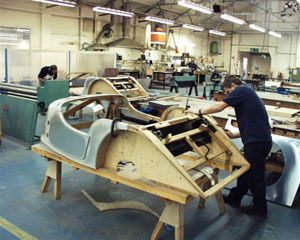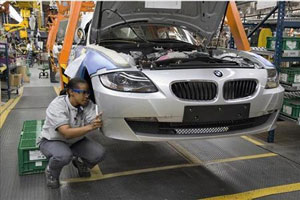Coachbuilder
Tasks & duties

Coachbuilders may do some or all of the following:
-
cut and shape metal parts
-
glaze and spray paint parts
-
cut and trim fibreglass
-
build the frame and fix it to the base
-
assemble the other parts such as the floor, roof and side panels
-
join these parts to the frame
-
install the upholstery and electrical wiring
-
repair and replace parts
-
fit additional parts, such as hydraulic lifts and refrigeration equipment, to vehicle bodies
-
make modifications to the frame or parts. If building motor homes, coachbuilders may also install plumbing, pressure-water systems, waste-water systems and gas in the vehicle
Specialisations
Coachbuilders usually specialise in buses, vans, trucks, caravans or motor homes. Some coachbuilders may work on a combination of these.
Skills & knowledge

Coachbuilders need to have:
-
knowledge of vehicle building materials and equipment
-
welding and panelbeating skills including the ability to cut and shape metal
-
skill in interpreting plans and sketches
-
basic maths and measuring skills
-
knowledge of Land Transport New Zealand regulations
-
knowledge of safe working practices
-
communication skills
Entry requirements
To become a coachbuilder you need to complete an apprenticeship and gain a National Certificate in Coachbuilding. For further information contact the New Zealand Motor Industry Training Organisation (MITO).
Secondary education
At least three years of secondary education is preferred. Useful subjects include English, maths and workshop technology.
Students can also take part in a secondary school automotive training programme (Startup) that is run by MITO and provides a pathway for students into the automotive industry. The programme includes both theory and practical components so students can gain NCEA credits as well as practical work experience. For further information contact the New Zealand Motor Industry Training Organisation (MITO).
Tertiary education
Some employers prefer their coachbuilder apprentices to have completed a National Certificate for Entry to Motor Body Trades.
Training on the job
Coachbuilders gain further skills on the job and may attend courses such as welding.
Useful experience
Useful experience for coachbuilders includes:
-
fabrication work such as welding and working with sheet metal
-
work in the building construction industry
-
assembling vehicles
-
work as a panelbeater
Video
From careersnz on you tube
Related courses
Automotive Body Construction
Automotive Engineering
Panel Beating
For more information, please refer to Career Services.
Document Actions
